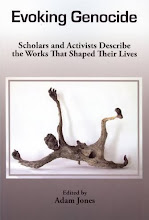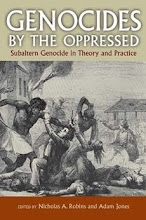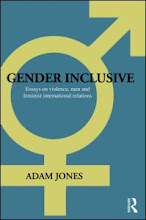My Fight May Be Hopeless, But It Is As Necessary As Ever
By George Monbiot
The Guardian (UK), May 21, 2012
"The term genocide conjures up attempts to kill an entire people: the German slaughter of the Jews or the Herero; the Turkish slaughter of the Armenians; the near-extermination of the Native Americans. But the identity of the crime does not depend on its scale or success: genocide means 'acts committed with intent to destroy, in whole or in part, a national, ethnic, racial or religious group'. Though, in 1995, the women and children of Srebrenica were first removed from the killing grounds by Bosnian Serb troops, though the 8,000 men and boys they killed were a small proportion of the Bosnian Muslim population, it meets the definition. So the trial of Ratko Mladic, the troops' commander, which began last week, matters. Whatever one thinks of the even-handedness of international law, and though it remains true that men who commissioned or caused the killing of greater numbers of people (George Bush and Tony Blair, for instance) have not been brought to justice and are unlikely to be, every prosecution of this kind makes the world a better place. So attempts to downplay or dismiss this crime matter too -- especially when they emerge from the unlikely setting of the internationalist left. I'm using this column to pursue a battle which might be hopeless, and which many of you might regard as obscure. Perhaps I have become obsessed, but it seems to me to be necessary. Tacitly on trial beside Mladic in The Hague is a set of ideas: in my view the left's most disturbing case of denial and doublethink since the widespread refusal to accept that Stalin had engineered a famine in the Ukraine. I first raised this issue a year ago, when I sharply criticised a book by two luminaries of the left, Edward Herman and David Peterson. The Politics of Genocide seeks to downplay or dismiss both the massacre of Bosniaks at Srebrenica in 1995 and the genocide of Tutsis committed by Hutu militias in Rwanda in 1994. Their claims are extraordinary: that the cause of death of the 'vast majority' of the Bosniaks at Srebrenica remains 'undetermined'; that rather than 800,000 or more Tutsis being killed by Hutu militias in Rwanda, 'the great majority of deaths were Hutu, with some estimates as high as two million', while members of the Hutus' Interahamwe militia were the 'actual victims' of genocide. What has changed since then is that the movement to which I thought I belonged has closed ranks: against attempts to challenge this revisionism, against the facts, in effect against the victims of these genocides.
My attempts to pursue this question number among the most dispiriting experiences of my working life. After I covered the issue last year, Herman and Peterson wrote a long denunciation on the Znet site. I believe in testing every proposition, so I set out to discover whether, as they insisted, I was wrong. I consulted four of the world's leading genocide scholars: Martin Shaw, Adam Jones, Linda Melvern and Marko Attila Hoare. I asked them each to write a brief response to the claims the two men made on Znet. Their statements, which I have also posted on my website, are devastating. They accuse Herman and Peterson of obfuscating, distorting and misrepresenting the evidence, and of engaging in genocide denial. For Edward Herman and David Peterson to be right, the entire canon of serious scholarship, human rights investigations, exhumations and witness statements would have to be wrong. Extraordinary claims require extraordinary evidence. But they offer little but the recycled claims of genocidaires and genocide deniers, mashed up with their own misrepresentations. But this discovery did not disturb me as much as the responses of their supporters. I wrote to Michael Albert, the publisher of Znet, asking whether he might publish Martin Shaw's review of Herman and Peterson's book (originally published in the Journal of Genocide Research) as a counterweight to their article. He flatly refused, then went on to accuse me of a long list of heinous beliefs. I wrote to Noam Chomsky, a hero of mine, who provided the foreword to Herman and Peterson's book, asking whether he had read it and whether he accepted the accounts it contains of the Rwandan genocide and the massacre of Srebrenica. Watching that brilliant mind engage in high-handed dismissal and distraction has been profoundly depressing. While failing to answer my questions, he accused me of following the Washington script (I have posted our correspondence on my website). John Pilger, who wrote a glowing endorsement of the book, volunteered this response: 'Chef Monbiot is a curiously sad figure. All those years of noble green crusading now dashed by his Damascene conversion to nuclear power's poisonous devastations and his demonstrable need for establishment recognition -- a recognition which, ironically, he already enjoyed.' The leftwing magazine Counterpunch cited my article as evidence that I am a member of the 'thought police', and that the role of the Guardian is 'to limit the imaginative horizons of readers'. Thus has this infectious idiocy spread through the political community to which I belong. The people I criticise here rightly contend that western governments and much of the western media ignore or excuse atrocities committed by the United States and its allies, while magnifying those committed by forces deemed hostile. But they then appear to create a mirror image of this one-sided narrative, minimising the horrors committed by forces considered hostile to the US and its allies. Perhaps this looks to you like the kind of esoteric infighting to which the left too often succumbs, but this seems to me to be important: as important as any other human rights issue. If people who claim to care about justice and humanity cannot resist what looks to me like blatant genocide denial, we find ourselves in a very dark place. Those of us who seek to judge a case on its merits, rather than according to the identity of the victims and perpetrators, have a duty to defend the memory of people being airbrushed by Herman, Peterson and their supporters. This does not make us apologists for western power, or establishment flunkies or thought police. It means only that we care about the facts."
[n.b. See also Monbiot's correspondence with Chomsky and the statements of genocide scholars, including myself.]
Monday, May 21, 2012
Subscribe to:
Post Comments (Atom)















No comments:
Post a Comment
Please be constructive in your comments. - AJ